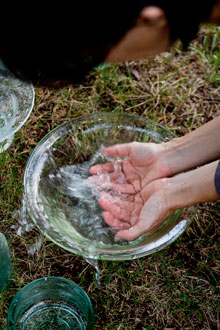
Dance, art, lectures and music continue to explore the year's theme of water, particularly as it relates in many ways to women during Women's History Month and on through the spring. Photo by Mark Teague.
This spring, Arts at Emory continues a yearlong exploration of the myriad ways that water and human behavior intersect and interact through a series of creative projects across campus. Emory artists in dance, theater, visual art, and music use the theme of water as a springboard for creations celebrating Women's History Month, examining global issues such as microfinance and public health, and even turning the popular flash mob phenomenon on its head.
Women and Water
The Center for Creativity & Arts along with the Center for Women at Emory celebrates March's Women's History Month with the "Women and Water" performance and lecture series, examining how lives of women across the world intersect with water. "Women do have a unique relationship to water—in birth, bathing, washing and cooking," explains Lori Teague, chair of the Emory Dance Program. "We approach the uniqueness of water with our senses as well as with our inner experience," she says. "The release of water and the perspective of women awaken the planet."
With the "Women and Water" series, Emory collaborators celebrate the female point of view without losing sight of the social responsibility we all share as inhabitants of a water-dependent planet. Says Teague: "It is very difficult to shift our choices of comfort into a more conscious use of our water supply and to think about this globally."
Thursday, March 1 marks the beginning of Emory's "Women and Water" celebration with "Women, Water, and Microfinance: Agents of Global Empowerment," a talk by April Rinne, director of WaterCredit, a microfinance initiative of water.org. In this talk, Rinne will discuss the relationship between women and water within the framework of gender relations and state policy. Co-sponsored by the Department of Women's, Gender and Sexuality Studies, this event will take place at 4 p.m. in White Hall 112.
The "Women and Water" series continues Tuesday, March 6 with "Women and Water • Vessel" an Emory Dance Program presentation at 5:30 p.m. in the Dance Studio of the Schwartz Center for Performing Arts. Emory theater and dance faculty come together for the first time onstage with the performance of "Women and Water." Fueled by storytelling, the collaborators intertwine movement and text to create image-based moments that convey personal experience and the impact of various states of water. Choreographed by Teague, "Vessel" showcases a small chorus of dancers in a performance ritual that examines the challenges faced by women who collect and manage water resources in underdeveloped countries. This event is co-sponsored by the Department of Theater and Dance at Emory.
Arts at Emory continues its "Women and Water" series with "Body of Water," Thursday, March 22 at 12 p.m. on the Emory Quadrangle. Putting their own spin on a flash mob, Emory's Dance Program invites hundreds of women representing a broad spectrum of cultures and disciplines to form a Movement Choir, walking together in a structured improvisation mimicking the dynamics of flow.
On World Water Day, the Center for Ethics and the Center for Women's Ali P. Crown Endowment presents "Women and Water: Empowering Women to Create a Sustainable Future," Thursday, March 22 at 7 p.m. in the Center for Ethics. In this talk, co-sponsored by the Emory Center for Ethics, national environmental advocate and eco-living expert Laura Turner Seydel will discuss the impact of women's rights on environmental conservation and global access to safe water.
The Emory Dance Program presents "Questions to ask a river, or a creek," April 12-14 at 7 p.m. on the Quadrangle. In this site-specific, live dance performance choreographed by Emory Dance's Teague, the question is posed: "What is required of us to become sustainable?"
Visual Arts
Beginning Monday, March 19, Rollins School of Public Health presents "Constructive interference: A dialogue on sanitation and health through inquiry and art," an interdisciplinary exploration of the impact of safe sanitation on human health. This visual arts exhibition, co-sponsored by the Emory Center for Creativity & Arts and the Center for Global Safe Water, features original artwork created through the collaboration of artists and scientists and examining themes of water and safe sanitation. This exhibition will be on view in the Rollins School of Public Health through Wednesday, May 16.
Environmental artist John Grade returns to campus to speak about his body of work as well as the experience of creating "Piedmont Divide," a two-part sculptural installation using recycled materials mounted on Emory's campus this past fall. "Piedmont Divide" visually and conceptually links two of Emory's most beloved and frequented locations, the Quadrangle and Lullwater Preserve, with breathtaking sculptures composed of recycled plastic icicles interacting with lake and rainwater. Grade's talk, presented by the Emory Visual Arts Program, takes place Wednesday, April 11 at 7 p.m. in the Michael C. Carlos Museum. "Piedmont Divide" is on view through April.
Music
The spring season's exploration of water concludes with a combined concert of the Emory Symphony Orchestra and Emory University Chorus, April 20-21 at 8 p.m. in the Schwartz Center for Performing Arts. This water-themed program includes Mozart's "Coronation Mass," Brahms' "Nänie," and Britten's "Four Sea Interludes from Peter Grimes;" directed by Richard Prior and Eric Nelson of the Emory Symphony Orchestra and University Chorus, respectively.
All events are free and open to the public. For more information, visit arts.emory.edu or see the Women's History Month calendar.
